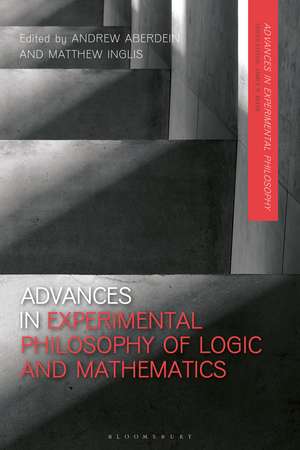Advances in Experimental Philosophy of Logic and Mathematics: Advances in Experimental Philosophy
Editat de Professor Andrew Aberdein, Matthew Inglisen Limba Engleză Hardback – mai 2019
| Toate formatele și edițiile | Preț | Express |
|---|---|---|
| Paperback (1) | 219.01 lei 6-8 săpt. | |
| Bloomsbury Publishing – 27 ian 2021 | 219.01 lei 6-8 săpt. | |
| Hardback (1) | 658.52 lei 6-8 săpt. | |
| Bloomsbury Publishing – mai 2019 | 658.52 lei 6-8 săpt. |
Din seria Advances in Experimental Philosophy
- 23%
 Preț: 192.10 lei
Preț: 192.10 lei - 23%
 Preț: 192.82 lei
Preț: 192.82 lei - 30%
 Preț: 511.97 lei
Preț: 511.97 lei - 13%
 Preț: 256.49 lei
Preț: 256.49 lei - 13%
 Preț: 257.03 lei
Preț: 257.03 lei - 22%
 Preț: 257.86 lei
Preț: 257.86 lei - 23%
 Preț: 235.91 lei
Preț: 235.91 lei -
 Preț: 256.38 lei
Preț: 256.38 lei - 22%
 Preț: 256.77 lei
Preț: 256.77 lei - 22%
 Preț: 226.97 lei
Preț: 226.97 lei - 22%
 Preț: 231.06 lei
Preț: 231.06 lei - 21%
 Preț: 219.01 lei
Preț: 219.01 lei - 22%
 Preț: 227.16 lei
Preț: 227.16 lei - 21%
 Preț: 218.18 lei
Preț: 218.18 lei - 23%
 Preț: 190.87 lei
Preț: 190.87 lei - 23%
 Preț: 191.04 lei
Preț: 191.04 lei - 23%
 Preț: 191.92 lei
Preț: 191.92 lei - 30%
 Preț: 511.23 lei
Preț: 511.23 lei - 30%
 Preț: 511.97 lei
Preț: 511.97 lei - 30%
 Preț: 513.43 lei
Preț: 513.43 lei - 30%
 Preț: 511.64 lei
Preț: 511.64 lei - 30%
 Preț: 510.68 lei
Preț: 510.68 lei -
 Preț: 250.59 lei
Preț: 250.59 lei -
 Preț: 249.46 lei
Preț: 249.46 lei
Preț: 658.52 lei
Preț vechi: 840.69 lei
-22% Nou
Puncte Express: 988
Preț estimativ în valută:
126.02€ • 131.08$ • 104.04£
126.02€ • 131.08$ • 104.04£
Carte tipărită la comandă
Livrare economică 14-28 aprilie
Preluare comenzi: 021 569.72.76
Specificații
ISBN-13: 9781350039018
ISBN-10: 1350039012
Pagini: 296
Dimensiuni: 156 x 234 mm
Greutate: 0.61 kg
Editura: Bloomsbury Publishing
Colecția Bloomsbury Academic
Seria Advances in Experimental Philosophy
Locul publicării:London, United Kingdom
ISBN-10: 1350039012
Pagini: 296
Dimensiuni: 156 x 234 mm
Greutate: 0.61 kg
Editura: Bloomsbury Publishing
Colecția Bloomsbury Academic
Seria Advances in Experimental Philosophy
Locul publicării:London, United Kingdom
Caracteristici
Specially commissioned chapters present new empirical results and outline future directions of research such as the logic of conditionals and the prevalence of mathematical platonism
Notă biografică
Andrew Aberdein is Professor of Philosophy at Florida Institute of Technology, USA.Matthew Inglis is Professor of Mathematical Cognition in the Mathematics Education Centre at Loughborough University, UK.
Cuprins
1. Introduction, Andrew Aberdein & Matthew Inglis2. Methodological Triangulation in Empirical Philosophy of Mathematics, Benedikt Löwe & Bart Van Kerkhove3. Animal Cognition, Species Invariantism and Mathematical Realism, Helen De Cruz4. The Beauty (?) of Mathematical Proofs, Catarina Dutilh Novaes5. Can a Picture Prove a Theorem? Using Empirical Methods to Investigate Visual Proofs by Induction, Josephine Relaford-Doyle & Rafael Núñez6. An Empirical Study on the Admissibility of Graphical Inferences in Mathematical Proofs, Keith Weber & Juan Pablo Mejía-Ramos7. Does Anyone Really Think That ?f? Is True If And Only If f? Robert Barnard & Joseph Ulatowski8. New Foundations for Fuzzy Set Theory, Igor Douven9. What Isn't Obvious About 'Obvious': A Data-Driven Approach to Philosophy of Logic, Moti Mizrahi10. Philosophy and the Psychology of Conditional Reasoning, David Over & Nicole Cruz11. Folk Judgments About Conditional Excluded Middle, Michael J. Shaffer & James Beebe
Recenzii
The essays are uniformly thoughtful, careful, and interesting . This collection demonstrates that new avenues of approach can point the way to new insights into philosophical concepts, they can help adjudicate between competing theories, and they can show how various subsets of the population make sense of ideas philosophers and mathematicians take for granted.
Imre Lakatos' call for a renaissance of empiricism in the philosophy of mathematics has at last been answered. This volume shows that deep questions in the philosophy of mathematics and logic can be attacked through empirical studies and non-foundational reasoning. Drawing on philosophy, logic, cognitive science and mathematics education, perennial questions are answered, including the roles of aesthetics and visualisation in proofs, and logic in practical reasoning. This landmark collection will undoubtedly be an indispensable resource for future research in this important field.
How are natural language terms actually used in technical contexts, and how do people interpret them? The answer is often surprising! This book extols the use of empirical studies to challenge implicit assumptions about the practice of philosophers and mathematicians, and the way that these groups talk about their practice.
Imre Lakatos' call for a renaissance of empiricism in the philosophy of mathematics has at last been answered. This volume shows that deep questions in the philosophy of mathematics and logic can be attacked through empirical studies and non-foundational reasoning. Drawing on philosophy, logic, cognitive science and mathematics education, perennial questions are answered, including the roles of aesthetics and visualisation in proofs, and logic in practical reasoning. This landmark collection will undoubtedly be an indispensable resource for future research in this important field.
How are natural language terms actually used in technical contexts, and how do people interpret them? The answer is often surprising! This book extols the use of empirical studies to challenge implicit assumptions about the practice of philosophers and mathematicians, and the way that these groups talk about their practice.
